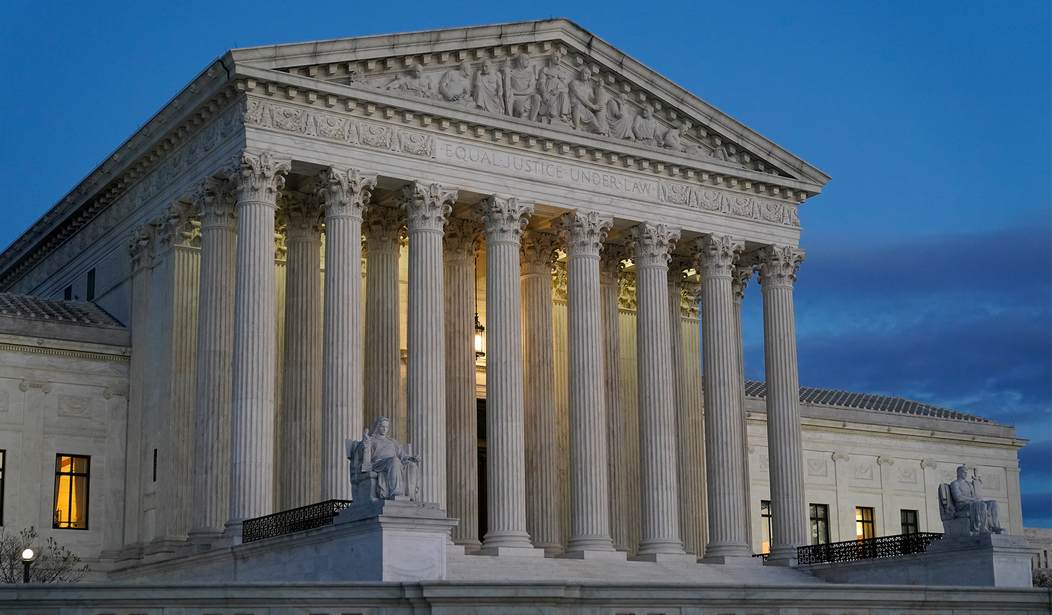On December 7, the United States Supreme Court will hear arguments in Moore v. Harper, a case that came about following 2020 reapportionment over a redistricting disagreement between the Democrat majority on North Carolina's exceedingly partisan state Supreme Court and the Republican-controlled state legislature.
The North Carolina Supreme Court ruled against the GOP legislature's redistricting map in a 4-3 decision that claimed — dubiously — that lawmakers had violated state law with a map that was gerrymandered in an improperly partisan manner. But conservatives in North Carolina and elsewhere take issue with the state judicial branch overriding Tarheel State residents' elected representatives in the legislature.
Now, state legislators who object to the North Carolina Supreme Court's action — and dispute the grounds and authority on which it ruled — are taking their plea to the U.S. Supreme Court, seeking to have the map they drew reinstated and the legislature's role as outlined in the U.S. Constitution's Election Clause upheld.
That clause states that times, places, and manners of holding elections for U.S. senators and representatives "shall be prescribed in each State by the Legislature thereof."
Jason Snead, executive director of the Honest Elections Project, told Townhall on Thursday that Moore v. Harper is an "immensely important case" that is "fundamentally about what the Elections Clause says" and will define "which institution is in the driver's seat" when it comes to redistricting and establishing election laws.
Snead said the issue at hand is as "simple as any Schoolhouse Rock video" that explains the arm of government empowered to write laws is the legislative branch. But instead of that simple conclusion, Snead said the case is another attempt by Democrats to "misuse courts" to achieve partisan goals.
Recommended
Pointing to the fact that there's "nothing expressly written in [North Carolina's] state constitution that has any kind of provision covering partisan gerrymandering," the grounds on which the state Supreme Court struck down the legislature's map. What's more, Snead added, there's "no role for the courts to play in North Carolina when it comes to drawing maps." Despite that reality, the Democrat-controlled state Supreme Court did draw its own map to replace the legislature's.
The way North Carolina's Supreme Court did all this was driven by what Snead characterized as part of a larger national trend for partisan state supreme courts that have a "desire to find the power to do what the courts want to do by looking at provisions" of the state constitution, "and then reading that to be whatever the courts want it to be."
In North Carolina, the state Supreme Court read a provision of the state constitution that Snead summarized as stating "elections have to be free and fair," upon which the Democrat majority on the court decided to "invent a provision against partisan gerrymandering" and also "seize the power to draw maps."
That reveals another problem conservatives and others, Snead included, point to: the North Carolina Supreme Court not only ruled on the legislature's redistricting map, but redrew them, thereby overstepping its authority. "What we've seen in North Carolina really distinguishes [the state Supreme Court's action]," Snead added, calling their actions a "very blatant attempt to seize power from the legislative body and then use it to advance a partisan agenda."
Democrats supporting the North Carolina Supreme Court's actions continue to push what Snead called a "doom and gloom scenario" about what would happen if the U.S. Supreme Court sides with the North Carolina legislature. Indeed, they have. Slate ran a piece calling Moore v. Harper "The Supreme Court Case That Could Upend Democracy." The Atlantic hypothesized that the Supreme Court "is poised to let state lawmakers overturn voters’ choice in presidential elections" in a move that would "derail America's Democracy."
Not so, explained Snead. He argued, contrary to what the Democrats and mainstream media are spinning, it was the North Carolina Supreme Court that had engaged in a "very bizarre model of democracy." Moore v. Harper, he explained "is not a threat to democracy" and is "not a vehicle for legislatures to retroactively change rules after an election nor a vehicle to overturn election results."
A report in ProPublica backs up Snead's dismissal of Democrat fearmongering, saying those who warn that the end of American democracy would follow a SCOTUS ruling in favor of the North Carolina legislature "ignore other legal protections that would prevent the theft of a presidential election" because existing federal law "requires states to choose their electors on Election Day" and "federal courts have held that after-the-fact changes raise questions of due process and equal protection." So no, a "state legislature can't simply swoop in after the voting and rewrite rules for a completed election because it didn't like the outcome," and no, a win for North Carolina's Republican legislature would not "derail democracy."
























Join the conversation as a VIP Member